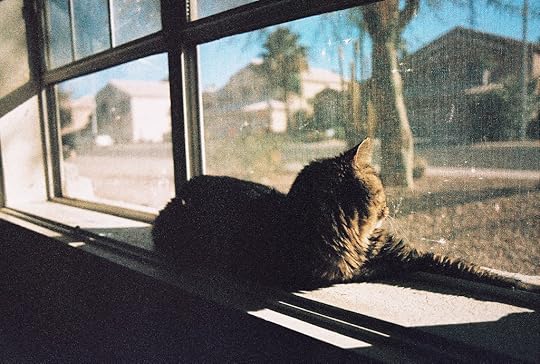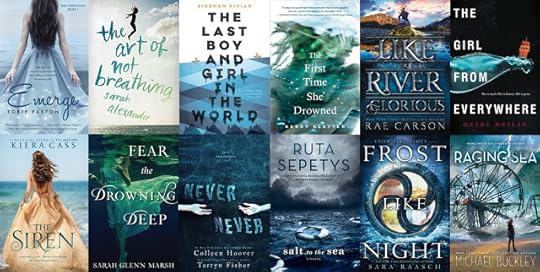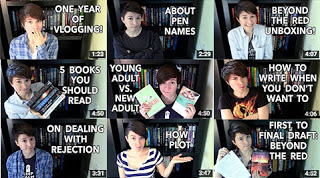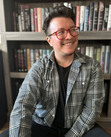Gabe Cole Novoa's Blog, page 37
June 22, 2016
Books(dot)Con Recap!
So Sunday and Monday was Books(dot)Con! And overall I think it went really well—the panels were great and packed full of a ton of great information about all aspects of publishing and writing. And because I know not everyone was able to tune in (which is fine, of course!) I thought I'd link all the panels and interviews here all together.
So! For the interested! Here we go:
Blending Genres with Heidi Heilig, Rin Chupeco, Katie Locke, LR Lam, and me:
Let's Talk About Disability with Corinne Duyvis, Katie Locke, and Kayla Whaley:
Comic Books and Web Comics with Mildred Louis, Nilah Magruder, Taneka Stotts, and Wendy Xu:
Gender and Sexuality with Taneka Stotts, Nita Tyndall, LR Lam, and Fox Benwell:
Alternatives to the Traditional Publishing Path with Dahlia Adler, Taneka Stotts, and Mildred Louis:
Exclusive Interview with Bernie Su:
Culture and Faith with Katie Locke, Nita Tyndall, Kaye M, and Rin Chupeco:
What Happens After You Sign With An Agent with Nita Tyndall, Katie Locke, Eric Smith, Corinne Duyvis, and me:
Neurodiversity and Mental Illness with Corinne Duyvis, Katie Locke, and Nita Tyndall:
Research: from Worldbuilding to Historical Accuracy with Katie Locke, LR Lam, Mildred Louis, Wendy Xu, and me:
A Peek Behind the Veil of the Industry with Alison Weiss, Eric Smith, McKelle George, and Whitley Abell:
Exclusive Interview with Elizabeth Wein:
Twitter-sized bite:





So! For the interested! Here we go:
Blending Genres with Heidi Heilig, Rin Chupeco, Katie Locke, LR Lam, and me:
Let's Talk About Disability with Corinne Duyvis, Katie Locke, and Kayla Whaley:
Comic Books and Web Comics with Mildred Louis, Nilah Magruder, Taneka Stotts, and Wendy Xu:
Gender and Sexuality with Taneka Stotts, Nita Tyndall, LR Lam, and Fox Benwell:
Alternatives to the Traditional Publishing Path with Dahlia Adler, Taneka Stotts, and Mildred Louis:
Exclusive Interview with Bernie Su:
Culture and Faith with Katie Locke, Nita Tyndall, Kaye M, and Rin Chupeco:
What Happens After You Sign With An Agent with Nita Tyndall, Katie Locke, Eric Smith, Corinne Duyvis, and me:
Neurodiversity and Mental Illness with Corinne Duyvis, Katie Locke, and Nita Tyndall:
Research: from Worldbuilding to Historical Accuracy with Katie Locke, LR Lam, Mildred Louis, Wendy Xu, and me:
A Peek Behind the Veil of the Industry with Alison Weiss, Eric Smith, McKelle George, and Whitley Abell:
Exclusive Interview with Elizabeth Wein:
Twitter-sized bite:
Missed @booksdotcon but want to hear from authors, editors, agents, & more? Check out this compilation. (Click to tweet)





Published on June 22, 2016 04:00
June 21, 2016
Vlog: Don't Worry About Idea Stealing
I semi-frequently hear from new writers who are too nervous to get critique partners because they worry about their book ideas being stolen. So here's why I don't think you have to worry about it.
RELATED LINKS:
Don't Worry About Other Writers Stealing Your Ideas (blog post version)Why You Need Critique Partners (Really) (vlog)5 Places to Find Critique Partners
Did you worry about this before working with critique partners for the first time? (I know I did.)
Twitter-sized bite:





RELATED LINKS:
Don't Worry About Other Writers Stealing Your Ideas (blog post version)Why You Need Critique Partners (Really) (vlog)5 Places to Find Critique Partners
Did you worry about this before working with critique partners for the first time? (I know I did.)
Twitter-sized bite:
Too worried about idea stealing to enter a pitch contest or work w/ a CP? @Ava_Jae says not to worry about it. #vlog (Click to tweet)





Published on June 21, 2016 05:40
June 20, 2016
On Taking Self-Care Days
 Photo credit: kevin dooley on FlickrI am a workaholic. This is a downside, I suppose, of (usually) enjoying the work you do—I work in a field I love (publishing), and get to spend many hours a day immersed in worlds I create, in worlds other people create, in blog posts and manuscripts and books, and it's a surprise to approximately no one who knows me that I get very immersed in my work.
Photo credit: kevin dooley on FlickrI am a workaholic. This is a downside, I suppose, of (usually) enjoying the work you do—I work in a field I love (publishing), and get to spend many hours a day immersed in worlds I create, in worlds other people create, in blog posts and manuscripts and books, and it's a surprise to approximately no one who knows me that I get very immersed in my work.(This is also a downside, I suppose, of working for myself. There's no one to tell me, "hey, you've done enough work today—go home and relax.")
So shortly after I graduated college, I realized if I wasn't careful, I was going to work myself into the ground. And so I established a weekly self-care day—a day when I'm not allowed to do any work; not answering e-mails, not writing, not plotting, not editing—this is a strictly work-free day.
So what do I do that day? I read a lot, mostly. And watch Hulu/Netflix, and play Assassin's Creed, or Sims 4, or Civilization V when I'm in the mood. And go out, and chat with my bestie, and do all sorts of things that don't involve working, all day.
It's a nice thing, and I do think it's helped, because come Monday (my day off is usually Sunday) I'm ready to dive in to work all over again.
I really do think it's important to take time off for yourself when you can. Writers are notoriously overworkers—many of us squeeze writing in during free hours or minute between day job, or school, or family, or all of the above, or, or, or—and it can be so easy to forget to take care of yourself.
So here is your reminder to take time off for yourself, too, whatever that means. It's important. You're important.
Do you take self-care days? What do you like to do during your work-free time?
Twitter-sized bite:
Do you take self-care days? @Ava_Jae talks about the importance of taking time off for yourself. (Click to tweet)





Published on June 20, 2016 04:00
June 17, 2016
Are You Going to Books(dot)Con?

So we all hear about big conferences every year, and many of us know the pain of watching from afar, stalking the conference hashtags, and looking at pictures, and thinking, wistfully, maybe next time.
The truth is, as wonderful as conferences are, they're expensive. Really expensive. From the registration fee, to the hotel charge, to the travel charge, plus food, and, well—it's not difficult to see why many people struggle to go.
However! The conference I'm participating in this Sunday and Monday is not one of those, because this conference is online—all shared via Google Hangouts and later YouTube. And (mostly) free.
Books(dot)Con is shaping up to be a really awesome conference. With author speakers like Corinne Duyvis, Heidi Heilig, Laura Lam, Fox Benwell, Dahlia Adler, Katherine Locke, and more, editor speakers like Alison Weiss, McKelle George, and Wendy Xu, agent speakers like Eric Smith, and Whitney Abell, illustrator speakers, diversity advocate speakers, blogger speakers, and exclusive interviews with Elizabeth Wein, and Bernie Su, the lineup looks pretty amazing.
I mean, just take a look at this schedule:

I'll also be taking query + first page critiques for the conference and afterward, for those who are interested in that sort of thing. And also there are workshops which look very cool too.
So hopefully, wherever you are, you'll be able to tune in if you're interested. Hope to see some of you guys there! :)
Will you be checking out Books(dot)Con this year?
Twitter-sized bite:
Check out @booksdotcon, an online conference w/ author, editor, agent, illustrator, & blogger speakers! (Click to tweet)





Published on June 17, 2016 04:00
June 15, 2016
When Struggling to Find the Words
 Photo credit: mdave on FlickrSo I've been first drafting again, now for the second time this year (and, come to think of it, second time in a couple months), which is both exciting because after perma-revision mode for so long, it's nice to be in draft-all-the-things mode, but also scary (because drafting), and a little tiring (because I want to draft something else this year too). Overall it's been really fun to dive into the new project—a project I've wanted to work on for a really long time—but I've also noticed the words, as of late, have not been coming so easily.
Photo credit: mdave on FlickrSo I've been first drafting again, now for the second time this year (and, come to think of it, second time in a couple months), which is both exciting because after perma-revision mode for so long, it's nice to be in draft-all-the-things mode, but also scary (because drafting), and a little tiring (because I want to draft something else this year too). Overall it's been really fun to dive into the new project—a project I've wanted to work on for a really long time—but I've also noticed the words, as of late, have not been coming so easily.*sigh*
Once upon a time, I used to be able to write 1,000 words in 30 minutes, with the aid of Write or Die and music (and 30 minute breaks). With my last WIP, I averaged around 700 words in 25 minutes, with a 5 minutes break, so about 1,400 words in an hour, assuming both sprints ended up in the average range. This time I've been averaging lower—sometimes in the 500 range per 25 minute sprint on a good day, or closer to 300ish words per 25 minute sprint on a not-so-good day.
Of course, even on the not-so-good days, the word count isn't awful, but it does feel noticeably slower—and more difficult, to me.
These harder-to-write days, weeks, manuscripts even happen to everyone regardless of experience level. And while I'm pretty sure I know why the struggle is happening more frequently than usual with this particular manuscript, the struggle is still...well. It's a struggle.
The good and bad news with this is while there isn't really a *cure* for difficult-to-write days (or manuscripts), it's not a death sentence, either. Assuming you stick with it and force yourself to keep writing even when the words are being less-than-friendly, the words will come. But it also means you maybe need to be patient with yourself, or give yourself more manageable goals. I moved my goal for this first draft a couple days to lower the daily word count I needed to meet my self-imposed deadline, for example, which has helped. I've also forced myself to take those five-minute breaks between writing sprints, because they make it easier to then dive in to the next 25 minute block.
The long and short of it is this happens to everyone, and while there isn't a guaranteed insta-fix, the best you can do is keep with it and know this isn't happening because you're manuscript is terrible, or you're terrible, or your writing skills are terrible, etc. If anything, it just means welcome to the club—writing is hard, and we've all been there.
What do you do when struggling to get the words down?
Twitter-sized bite:
Author @Ava_Jae shares her experience struggling to find the words when first drafting. (Click to tweet)





Published on June 15, 2016 04:00
June 14, 2016
Vlog: On Age and Publishing
Are you a young writer who wants to get published ASAP? Or worried you're too young or old to get published? Today I'm talking about age, publishing, and lessons I learned when I was a teen desperate to get published.
RELATED LINKS:
Writing & Publishing: Does Age Matter?4 Mistakes I Made as a New Writer
What do you think?
Twitter-sized bites:





RELATED LINKS:
Writing & Publishing: Does Age Matter?4 Mistakes I Made as a New Writer
What do you think?
Twitter-sized bites:
"Learning how to write and getting your skills publication-ready takes a lot of time." (Click to tweet)
On age, pressure to publish ASAP, and taking your time to improve your writing. #vlog (Click to tweet)





Published on June 14, 2016 08:19
June 13, 2016
Fixing the First Page Giveaway #24
 Photo credit: wwarby on Flickr2016 is whipping right past us and we're now nearly halfway through June! Which means it's time for the next Fixing the First Page feature—the 24th, in fact, which means this feature has been going on for two years now! Time definitely does fly.
Photo credit: wwarby on Flickr2016 is whipping right past us and we're now nearly halfway through June! Which means it's time for the next Fixing the First Page feature—the 24th, in fact, which means this feature has been going on for two years now! Time definitely does fly.So for those who’ve missed before, the Fixing the First Page features is a public first 250 word critique. Using the lovely rafflecopter widget, anyone interested in winning a PUBLIC (as in, featured in a post on this blog) first page critique can enter.
For an example of what this critique will look like, here's the last Fixing the First Page post.
Rules!
ONLY the first 250 words will be critiqued (up to finishing the sentence). If you win and send me more, I will crop it myself. No exceptions.
ONLY the first page. I don’t want 250 random words from your manuscript, or from chapter 3. If you win the critique and send me anything other than the first 250 words of your manuscript, I will choose someone else.
I will actually critique it. Here. On the blog. I will say things as nicely as I can, but I do tend to be a little blunt. If you’re not sure you can handle a public critique, then you may want to take some time to think about it before you enter.
Genre restrictions. I'm most experienced with YA & NA, but I will still accept MG and Adult. HOWEVER. If your first page has any erotic content on it, I ask that you don’t enter. I want to be able to post the critique and the first 250 in its entirety without making anyone uncomfortable, and if you win and you enter a page with erotic content, I will choose someone else.
You must have your first page ready. Should you win, you need to be able to submit your first page within 48 hours of my contacting you to let you know you won. If 48 hours pass and I haven’t heard from you, again, I will choose someone else.
You’ll get the most out of this if it isn’t a first draft. Obviously, I have no way of knowing if you’re handing me a first draft (though I will probably suspect because it’s usually not that difficult to tell). I won’t refuse your page if it’s a first draft, but you should know that this critique will likely be of more use if you’ve already had your betas/CPs look over it. Why? Because if you don’t, the critique I give you will probably contain a lot of notes that your betas & CPs could have/would have told you.
There will not be a round 2 (unless you win again in a future contest). I hate to have to say this, but if you win a critique, it’s NOT an invitation to send me a bunch of your revisions. I wish I had the time available to be able to look at revisions, but sadly, I don’t. If you try to break this rule, I will nicely say no, and also remember to choose someone else should you win a second contest. Which would make me sad. :(
So that’s it! If you’re okay with all of the above and would like to enter to be the twenty-second public critique on Writability, do the thing with the rafflecopter widget below. You have until Monday, June 20 at 11:59 EST to enter!
a Rafflecopter giveaway





Published on June 13, 2016 04:00
June 10, 2016
2016 YA Cover Trends
So back in 2015 when the 2016 covers first started hitting the web, I thought it'd be fun to do a cover trend post. At the time there weren't quite enough covers out for me to do a comprehensive post, but now we're roughly halfway through 2016, so most of the books releasing this year have had their cover reveals.
Which means I can finally do this post.
Cover trends are always fun to look at—from the pretty girls in dresses, to the hands and feet trends of previous years, I've always thought it was interesting to see just how many books fit into any given trend.
For 2016 I noticed five main trends:
Water

Silhouettes

Big Text Down the Middle

People's Backs

Black Background

I'm not exactly sure why or how cover trends happen every year, but they're certainly fun to look at.
What other cover trends have you noticed this year?
Twitter-sized bite:





Which means I can finally do this post.
Cover trends are always fun to look at—from the pretty girls in dresses, to the hands and feet trends of previous years, I've always thought it was interesting to see just how many books fit into any given trend.
For 2016 I noticed five main trends:
Water

Silhouettes

Big Text Down the Middle

People's Backs

Black Background

I'm not exactly sure why or how cover trends happen every year, but they're certainly fun to look at.
What other cover trends have you noticed this year?
Twitter-sized bite:
What 2016 YA cover trends have you noticed? @Ava_Jae breaks some down. (Click to tweet)





Published on June 10, 2016 04:00
June 8, 2016
How to Become a Writer YouTuber
 So back in May 2014, I made a vlog to introduce myself to the internet. Prior to that, I had a stack of books as my avatar on all my social media sites, and for whatever reason, I thought the way I would show my face to the internet should be through a vlog rather than a selfie.
So back in May 2014, I made a vlog to introduce myself to the internet. Prior to that, I had a stack of books as my avatar on all my social media sites, and for whatever reason, I thought the way I would show my face to the internet should be through a vlog rather than a selfie.I made a channel, bookishpixie, just for that vlog, and then thought, what the hell? I'll just keep doing this.
So I did. And to be honest, I wasn't really expecting all that much in terms of subscribers—I figured there probably weren't that many writers on YouTube, right? It just seemed so different from the written media I was used to seeing writers interact on, and I knew of only a couple writing-related channels, so I figured there probably just wasn't much a demand for it.
Wellllll I was wrong. So wrong.
Turns out, there are a lot of writers and people interested in publishing on YouTube—and I have to say, the writerly community there has been one of the most supportive and welcoming I've ever seen.
So how do you vlog and build a community on YouTube? It's not as difficult as you might think.
Vlog preparation:
Decide on a topic. Like blogging, this is easily the hardest step—figuring out what to vlog about. Luckily, I have nine times as many blog posts as I do vlogs, so if I ever really get stuck, I sometimes go through my archives and pick a topic I've blogged about but haven't vlogged about. Because while some of my YouTube audience has peeked over at my blog, a lot haven't, and even though I share my vlogs on the blog here too, I am more than well aware that most of you haven't read all 900+ posts, so reviving a topic here and there can be helpful for everyone.
Bullet points. While some YouTubers rely on a script, I personally prefer to just jot down a few bullet points of the main things I'm going to cover, then improvise everything in between. This helps because I never sound stilted or get stuck trying to remember the exact phrasing of my script, and it also keeps things flexible. (Note: I use this same approach for speeches, too! Bullet points are so much easier to remember than line by line scripts.)
Film! There's actually a lot that goes into this step—setting up lighting, figuring out where to put the camera, resetting the white balance and exposure on the camera every time I turn it on, etc. I have an advantage here in that I went to school for film for three years, so I know the basics in camera prep, but I'm also missing a lot of the professional gear I had access to in film classes way back when, so...maybe one day. Now I have most everything set up the way I want it all week so all I have to do is turn on the lights and camera when I'm ready to go.
Edit. I have a Mac, so I use iMovie to edit all of my vlogs. Generally, I split up the vlog editing over three days (Thursday-Saturday). Day one: importing and cutting out the pauses and obvious mess ups (I do one long take instead of multiple takes, so this means when I mess up when I'm speaking I just stop and restart. During this step, I remove the in-between silences and frustrated outtakes). Day two: choosing the best takes/deleting duplicate takes (I repeat everything three times ish when vlogging) until I have the basic vlog. Day three: detailing (trimming clips, adding text when needed, cutting more if the vlog is too long, etc.) Note: I personally try to keep vlogs four minutes or under whenever possible, because too much longer than that and people start to lose interest.
Upload to YouTube. This is actually multiple steps—the uploading itself, creating the title picture that will be the still when the vlog isn't playing, filling out the description for the vlog, and writing out the captions. I usually do this on Mondays.
So those are the basics for getting the vlog up. In terms of growing your channel, the main steps I've relied on are basically the same as growing any other social media account.
Consistent posting. I decided from the start I'd do one vlog a week (Tuesdays). Vlogs are a lot of work, so the weekly post works well for me because it doesn't add too much work to my already packed social media schedule. The reason consistency is so important, however, is because the more consistently you post, the better your audience will know to come back. Plus it shows your audience that you're committed and aren't going to just drop off the face of the internet.
Pay attention to your community (answer the comments). I can't tell you how many times I've had commenters say how nice it is to hear back from me, because most of the channels they comment on never get responses from the creators. While answering *all* the comments may one day be unfeasible (if the channel gets too big, for example), it's good to show your community that you're involved and listening to what they say. I'm not always able to answer channel comments quickly, but I do try to make sure I get to as many of them as I can.
Cross-post. Cross-posting whenever possible is sooooo helpful. I cross-post all of my vlogs to the blog here (which then links to my Twitter), tumblr, and Facebook. Cross-posting is a great way to get discovered and spread your creation around—you never know when a tweet or tumblr post will go viral and get you a host of new subscribers, even months after you posted.
So those are my YouTube channel-building tips! I definitely recommend vlogging if it's something you think you could consistently do—it's been a great experience for me even though I was *completely* terrified of the camera when I started, and has not only helped in terms of getting the word out for my blog and book, but has also made me way more confident when public speaking. Bonus! :)
Have you ever considered vlogging?
Twitter-sized bite:
Curious about what goes into running a YouTube channel? @Ava_Jae breaks down some steps and tips. (Click to tweet)





Published on June 08, 2016 04:00
June 7, 2016
Vlog: On (Terrible) First Drafts
Writing the first draft can be really challenging—not the least of which because it often feels like the writing is awful. Today I'm talking about first drafting and why terrible first drafts are totally okay.
RELATED LINKS:
First to Final Draft: BEYOND THE RED (vlog)On Editing (YouTube Playlist)On Writing the Perfect Project (vlog)How to Finish a WIP (vlog)Why First Draft Writing SucksWhy the First Draft is Usually Awful (and Why it's Okay)
Do you struggle to get the first draft down?
Twitter-sized bites:





RELATED LINKS:
First to Final Draft: BEYOND THE RED (vlog)On Editing (YouTube Playlist)On Writing the Perfect Project (vlog)How to Finish a WIP (vlog)Why First Draft Writing SucksWhy the First Draft is Usually Awful (and Why it's Okay)
Do you struggle to get the first draft down?
Twitter-sized bites:
Not feeling confident about your first draft? @Ava_Jae explains why terrible first drafts are totally okay. #vlog (Click to tweet)
Do you struggle with the drafting process? @Ava_Jae vlogs about why terrible first drafts are okay. #writetip (Click to tweet)





Published on June 07, 2016 04:00



